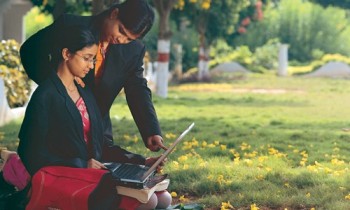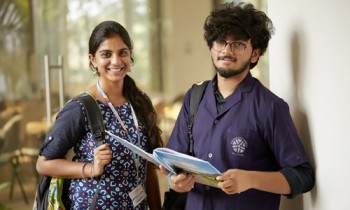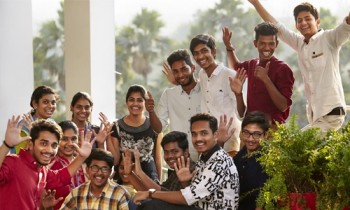- Programme Description
- Programme Structure
- Programme Enquiry
Programme Educational Objectives (PEOs)
PEO 1: Analyse problems and find solutions in allied domains using multidisciplinary approach.
PEO 2: To carry out critical and creative analyses in designing biomedical equipments with latestengineering tools and techniques.
PEO 3: Disseminate professional skills for ethical and societal responsibilities.
Programme Specific Outcomes (PSOs)
The students will be able to
PSO 1: Design hardware and software systems for modern biomedical instruments and applications.
PSO 2: Use and demonstrate the modern techniques and engineering tools to give solution to biomedical engineering challenges.
PSO 3: Function effectively with in multidisciplinary teams to understand the precepts of effective project management.
Programme Outcomes (POs)
Programme Outcomes (POs), are attributes acquired by the student at the time of graduation. The POs given in below, ensure that the POs are aligned to the Graduate Attributes (GAs) specified by National Board of Accreditation (NBA). These attributes are measured at the time of Graduation.
PO 1: Engineering knowledge: Apply the knowledge of mathematics, science, engineering fundamentals, and an engineering specialization to the solution of complex engineering problems.PO 2: Problem analysis: Identify, formulate, review research literature, and analyze complex engineering problems reaching substantiated conclusions using first principles of mathematics, natural sciences, and engineering sciences.
PO 3: Design/development of solutions: Design solutions for complex engineering problems and design system components or processes that meet the specified needs with appropriate consideration for the public health and safety, and the cultural, societal, and environmental considerations.
PO 4: Conduct investigations of complex problems: Use research-based knowledge and research methods including design of experiments, analysis and interpretation of data, and synthesis of the information to provide valid conclusions.
PO 5: Modern tool usage: Create, select, and apply appropriate techniques, resources, and modern engineering and IT tools including prediction and modelling to complex engineering activities with an understanding of the limitations.
PO 6: The engineer and society: Apply reasoning informed by the contextual knowledge to assess societal, health, safety, legal and cultural issues and the consequent responsibilities relevant to the professional engineering practice.
PO 7: Environment and sustainability: Understand the impact of the professional engineering solutions in societal and environmental contexts, and demonstrate the knowledge of, and need for sustainable development.
PO 8: Ethics: Apply ethical principles and commit to professional ethics and responsibilities and norms of the engineering practice.
PO 9: Individual and team work: Function effectively as an individual, and as a member or leader in diverse teams, and in multidisciplinary settings.
PO 10: Communication: Communicate effectively on complex engineering activities with the engineering community and with society at large, such as, being able to comprehend and write effective reports and design documentation, make effective presentations, and give and receive clear instructions.
PO 11: Project management and finance: Demonstrate knowledge and understanding of the engineering and management principles and apply these to one's own work, as a member and leader in a team, to manage projects and in multidisciplinary environments.
PO 12: Life-long learning: Recognize the need for, and have the preparation and ability to engage in independent and life-long learning in the broadest context of technological change.
| I Year (R21 Regulation) | I Semester | |||||
|---|---|---|---|---|---|---|
| Code | Subject | L | T | P | C | |
| 21HS102 | Engineering Mathematics - I | 3 | 1 | - | 4 | |
| 21HS115 | Engineering Physics | 3 | - | 2 | 4 | |
| 21EE101 | Basic Electrical and Electronics Engineering | 3 | - | 2 | 4 | |
| 21ME101 | Engineering Graphics and Design | 2 | - | 2 | 3 | |
| 21CS151 | Introduction to C Programming | 3 | - | 2 | 4 | |
| 21HS124 | Constitution of India | 1 | - | - | 1 | |
| 21PC001 | Physical Fitness, Sports & Games - I | - | - | 2 | 1 | |
| Total | 17 | 1 | 13 | 24 | ||
| I Year (R21 Regulation) | II Semester | |||||
|---|---|---|---|---|---|---|
| Code | Subject | L | T | P | C | |
| 21HS108 | Engineering Mathematics - II | 3 | 1 | - | 4 | |
| 21BM101 | Clinical Biochemistry | 3 | - | 2 | 4 | |
| 21BM102 | Fundamentals of Anatomy and Physiology | 3 | - | 2 | 4 | |
| 21CS152 | Programming for Problem Solving | 3 | - | 2 | 4 | |
| 21HS123 | Technical English Communication | 2 | - | 2 | 3 | |
| 21ME103 | Workshop | 1 | - | 2 | 2 | |
| 21HS122 | English Proficiency and Communication Skills | - | - | 2 | 1 | |
| 21PC002 | Physical Fitness, Sports & Games - II | - | - | 2 | 1 | |
| Total | 15 | 1 | 15 | 23 | ||
| II Year (R19 Regulation) | III Semester | |||||
|---|---|---|---|---|---|---|
| Code | Subject | L | T | P | C | |
| 19HS203 | Probability and Statistics | 3 | 1 | - | 4 | |
| 19BM201 | Basic Clinical Sciences | 3 | - | - | 3 | |
| 19BM202 | Clinical Biochemistry | 3 | - | 2 | 4 | |
| 19BM203 | Analog Electronic Circuits | 3 | - | 2 | 4 | |
| 19BM204 | Electric Circuit Theory | 3 | 1 | - | 3 | |
| 19HS204 | Environmental Studies | 1 | - | - | 1 | |
| 19PC003 | Life Skills - I | - | - | 2 | - | |
| 19PC004 | Technical Seminar - I | - | - | 2 | 1 | |
| 19PC005 | Intra-Disciplinary Projects - I | - | - | 3 | 1 | |
| 19PC006 | Physical fitness, Sports & Games - III | - | - | 2 | 1 | |
| Total | 16 | 2 | 12 | 22 | ||
| II Year (R19 Regulation) | IV Semester | |||||
|---|---|---|---|---|---|---|
| Code | Subject | L | T | P | C | |
| 19BM211 | Signals and Systems for Bioengineers | 3 | - | 2 | 4 | |
| 19BM212 | Digital Electronic Circuits | 3 | - | 2 | 4 | |
| 19BM213 | Biomedical Instrumentation | 3 | - | 2 | 4 | |
| 19BM214 | Biomaterials and Artificial Organs | 3 | - | - | 3 | |
| 19MS302 | Management Science | 3 | - | - | 3 | |
| 19PC007 | Life Skills - II | - | - | 2 | 1 | |
| 19PC008 | Technical Seminar - II | - | - | 2 | 1 | |
| 19PC009 | Intra-Disciplinary Projects - II | - | - | 2 | 1 | |
| Open Elective - 1 | 3 | - | - | 3 | ||
| Total | 18 | - | 12 | 24 | ||
| III Year (R16 Regulation) | V Semester | |||||
|---|---|---|---|---|---|---|
| Code | Subject | L | T | P | C | |
| 16BM301 | Analog and Digital Communication | 3 | - | 2 | 4 | |
| 16BM302 | Biocontrol Systems | 3 | 1 | - | 4 | |
| 16BM303 | Biomedical instrumentation | 3 | 1 | 2 | 5 | |
| 16BM304 | Fundamentals of Microcontrollers | 3 | - | 2 | 4 | |
| Department Elective | - | - | - | 3-4 | ||
| Department / Open Elective | - | - | - | 3-4 | ||
| Employability and Life Skills Elective | - | - | - | 1-3 | ||
| Total | 12 | 2 | 6 | 24-28 | ||
| III Year (R16 Regulation) | VI Semester | |||||
|---|---|---|---|---|---|---|
| Code | Subject | L | T | P | C | |
| 16HS301 | Professional Ethics | 2 | - | - | 2 | |
| 16BM305 | Biomedical Signal Processing | 3 | 1 | 2 | 5 | |
| 16BM306 | Diagnostic and Therapeutic Equipments-I | 3 | 1 | - | 4 | |
| 16BM307 | Medical informatics | 3 | - | - | 3 | |
| 16BM308 | Medical Imaging Techniques | 3 | 1 | - | 4 | |
| Department Elective | - | - | - | 3-4 | ||
| Department / Open Elective | - | - | - | 3-4 | ||
| Employability and Life Skills Elective | - | - | - | 1-3 | ||
| Total | 14 | 3 | 4 | 25-29 | ||
| IV Year (R16 Regulation) | VII Semester | |||||
|---|---|---|---|---|---|---|
| Code | Subject | L | T | P | C | |
| 16BM401 | Diagnostic and Therapeutic Equipments-II | 3 | - | 2 | 4 | |
| 16BM402 | Medical Image Processing | 3 | 1 | 2 | 5 | |
| 16BM403 | Tele Medicine | 3 | 1 | - | 4 | |
| 16MS201 | Management Science | 3 | - | - | 3 | |
| Dept.Elective | - | - | - | 3-4 | ||
| Department / Open Elective | - | - | - | 3-4 | ||
| Employability and Life Skills Elective | - | - | - | 1-3 | ||
| Total | 15 | 2 | 4 | 25-29 | ||
| IV Year (R16 Regulation) | VIII Semester | |||||
|---|---|---|---|---|---|---|
| Code | Subject | L | T | P | C | |
| 16BM411/16BM412 | Project work / Internship | - | - | 30 | 15 | |
| Total | - | - | 30 | 15 | ||
| L=Lecture; T=Tutorial; P=Practicals; C=Credits; |
| Programme Name | B.Tech in Biomedical Engineering | |
| Level | Under Graduation | |
| Programme Specific Enquiries | 0863-2344735 | |
| Admission Enrollment and General Enquiries | 0863-2344777, 1800-425-2529 |
|
| HoD Contact Number | 9398917124 | |












